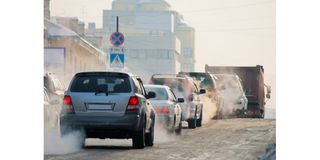Drivers and passengers, what do you know about ‘idling’?

Many of us associate being “idle” with laziness and having “nothing” to do. Hanging out. Passing time. Letting days go. Actually, a Biblical reference in Proverbs 16 : 27 claims that “an idle mind is the devil’s workshop.” Meaning we should use our time carefully otherwise unwanted, temptations knock doors.
Personally I like “doing nothing” sometimes.
Resting for me does not mean watching TV, fidgeting with the phone, or chatting with pals. No action activity is quite good for the heart and mind which are always on high speed.
So idleness is the opposite of stress and tension, pressure and anxiety.
But there is another type of idleness. Most of us might not be aware of it. When I was a young journalist riding a motorbike I would leave it idling for ages. This was mostly to avoid restarting the engine. If you have ever handled a motorcycle you know how you need to pump the little gadget with your foot.
Those days I would get tired of the whirring, grinding and high pitched noises that popped out (annoyingly) from the bike, sometimes. So to avoid it, especially if I had just stopped (briefly) to pick up something at a shop or drop a passenger, I would leave the engine idling.
With cars it is much more serious. And seriously, unnecessary. Cars just need fingers and the switch around your steering wheel. Despite that motorists do leave their cars idling for ages. This is very bad for the environment. Pollution by vehicles is one of the biggest contributors to dirty, foul, unhealthy air.
London’s Evening Standard carried a very interesting chat on Tuesday. The reader-letters page displayed two entries on idling. One by Mary Forster yelled: “Stopping Idling Engines, Boost Our Health.”
She set off by saying that the fight against pollution will not succeed if cars do not stop idling.
Ms Forster: “On one hour walk, I regularly encounter an average of three or four cars parked for 15-20 minutes while the drivers are engrossed in their phones with the noxious fumes from their engines pouring into the lungs of passers-by.”
Then she hit the bull to quote a game of darts (if you have ever played this famous pub game ) :
“I dread to think what effect this must have on the lungs of babies and young children who are on level with the exhaust pipe and it is particularly prevalent at the school gates.”
She concluded by declaring that if this is curbed it would improve air quality and reduce hospitalisation.
Evening Standard Editor Ross Lydall was very impressed. He replied by saying it is true but unfortunately, hard to police. He narrated an incident in 2017 whereby a road patrol official was walking around East London and told a driver to switch her idling engine off, “but received a volley of abuse.”
Drivers tend to be ignorant and aggressive, as regards idling. Most are aware of speed rules, paying parking tickets, road tax , even servicing cars but not idling. It is like drivers who navigate roads and country lanes with dirty exhausts and non functioning lights. Unaware of the effect the dark, grey filth smoke is doing on our mother earth like the ES letter writer, Mary Forster just highlighted. Health of our children.
Now.
Idling is top of the ladder.
Very few are unaware of the impact it has on our lives and health. It is not just a London issue, but of major cities of the world. Real and visible it accompanies these 20th century inventions called cars, buses and lorries.
Six years back, a US study a reported that researchers found 3 billion gallons of fuel emitted from vehicles ”generate around 30 million tons of Carbon Dioxide every year just by idling.”
That is a lot of dirty smoke.
Idling is a reality in African cities, too. Giving an example, in 2018, the World Health Organisation (WHO) argued that 19,000 Kenyans die prematurely each year from lung related illnesses due to pollution. Take a city like Nairobi.
Here matatus are left idling to attract passengers. We have a similar situation in Tanzania with the vipanyas and daladalas.
Drivers have to keep their engines revving to make travellers think they are about to leave. HURRY UP! HARAKA!
In London buses automatically switch off engines ( temporarily) while stopping to pick up passengers. Might appear trivial or small, but such actions, do help. One of the few successes of campaigns by the British Lung Foundation.
More needs to be done though.
Everywhere.
But first is awareness.
Dear reader.
Do you understand what idling is now?
How are you going to try and make our environmental air cleaner?
Tell us.





